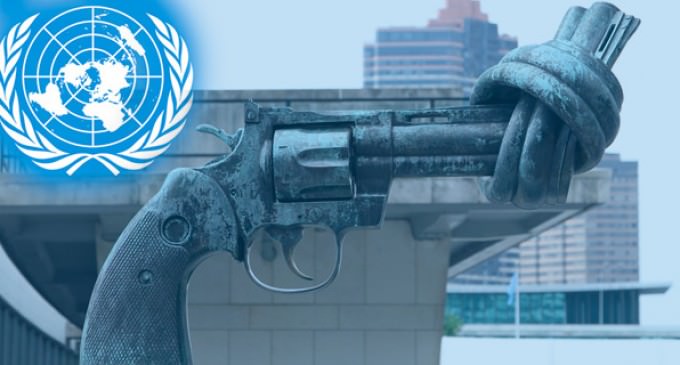
The United Nations Office for Disarmament Affairs, which is housed right here in the United States, has announced that the UN’s Arms Trade Treaty (ATT) “will enter into force on 24 December 2014.”
Merry Christmas everyone…the UN decided that Christmas Eve of this year was the beginning of the end of civilian gun ownership worldwide.
Secretary of State John Kerry already signed the ATT on behalf of the Obama administration on Sept. 25th 2013.
To Read More + Watch Video Click The Link Below:

Remember these are one of our freedoms, we just hear about the trouble makers more.
I thought Congress had to sign it and thet have not
Was it approved by Congress or did Obama say that he is all for I
the U>N> can get out of this country , do not come back
The Arms Trade Treaty has nothing to do with restricting the legal sale or ownership of guns within the United States. The aim of the U.N. Arms Trade Treaty is to combat the illicit international trade of arms by “tightening regulation of, and setting international standards for, the import, export and transfer of conventional weapons” in order to “close gaps in existing regional and national arms export control systems that allow weapons to pass onto the illicit market”:
The Arms Trade Treaty obligates member states to monitor arms exports and ensure that weapons don’t cross existing arms embargoes or end up being used for human-rights abuses, including terrorism. Member states, with the assistance of the U.N., will put into place enforceable, standardized arms import and export regulations (much like those that already exist in the U.S.) and be expected to track the destination of exports to ensure they don’t end up in the wrong hands. Ideally, that means limiting the inflow of deadly weapons into places like Syria.
The text of the proposed treaty specifically “reaffirms the sovereign right and responsibility of any State to regulate and control transfers of conventional arms that take place exclusively within its territory, pursuant to its own legal or constitutional systems,” so even if such a treaty came to pass, U.S. rights and laws regarding the sale and ownership of small arms would still apply within the United States.
The Obama administration has stated that mandatory conditions for U.S. approval of such an arms trade treaty include the following:
The Second Amendment to the Constitution must be upheld.
There will be no restrictions on civilian possession or trade of firearms otherwise permitted by law or protected by the U.S. Constitution.
There will be no dilution or diminishing of sovereign control over issues involving the private acquisition, ownership, or possession of firearms, which must remain matters of domestic law.
As the Wall Street Journal reported, the U.S. ‘voted in favor [of the treaty only] after the Obama Administration secured its key “red line” that the treaty would have no impact on the Second Amendment. The final draft specifies “non-intervention in matters which are essentially within the domestic jurisdiction” of signatories.’
No such treaty could “bypass the normal legislative process in Congress,” as all treaties to which the U.S. is a signatory must first be approved by a two-thirds vote of the U.S. Senate before they are considered to be ratified and binding.
The President of the United States cannot enact a “complete ban on all weapons for US citizens through the signing of international treaties with foreign nations.” The right to keep and bear arms is guaranteed in the Constitution of the United States, and in the 1957 case Reid v. Covert, the U.S. Supreme Court established that the Constitution supersedes international treaties ratified by the U.S. Senate.
As Rachel Stohl, a senior associate with the Managing Across Boundaries initiative at the Stimson Center and co-author of the book The International Arms Trade, noted:
Those opposed to the accord have misrepresented what it does, suggesting that it would somehow infringe on American gun owners’ rights. It would do nothing of the kind.
The treaty applies only to international transfers of conventional arms and, in fact, reaffirms “the sovereign right of any State to regulate and control conventional arms” within its territory. The treaty’s preamble also makes specific reference to the legitimate trade, lawful ownership and use of certain conventional arms for recreational, cultural, historical and sporting activities.
Secretary of State John Kerry emphasized these points in his statement welcoming the treaty’s adoption, noting that “nothing in this treaty could ever infringe on the rights of American citizens under our domestic law or the Constitution, including the Second Amendment,” a point on which the United States insisted throughout the negotiations. This treaty has no reach into domestic gun policy, nor would it create a United Nations gun registry. There is absolutely nothing in it that violates the Second Amendment.
In short, there is no “legal way around the 2nd Amendment” other than a further amendment to the Constitution that repeals or alters it, or a Supreme Court decision that radically reinterprets how the 2nd Amendment is to be applied.
Read more at http://www.snopes.com/politics/guns/untreaty.asp#zEjIlrGEbYVeyM6p.99
I think not!!
maeby read between the lines ?? is this the start of something bigger ??
Fu@K The UN!!! anyone that does own a gun is entitled to own it—- And those that don
‘don’t don’t have to either—WE as a Nation must stand up to this or there will be Martial Law just like when they were trying to exterminate the Jews!!!!
Mary Cannella Butler: if you actually believe what you posted, I have a bridge in Brooklyn I need to sell, quick, to raise capital. I’ll sell to you and you can make it a toll bridge, but I need to raise the capital now, so let’s make a deal…
Remember the phrase, “it’s good to be the king.”